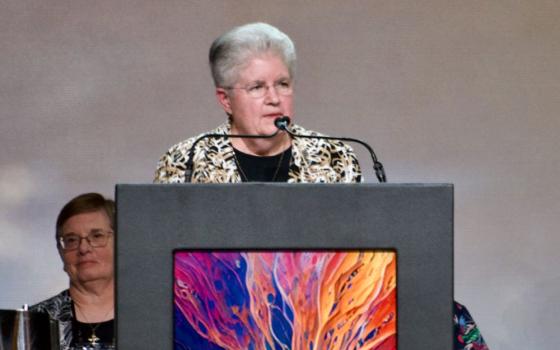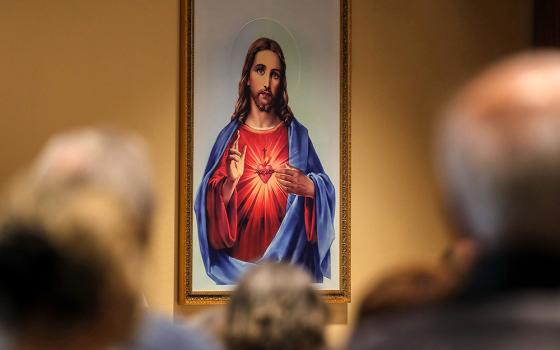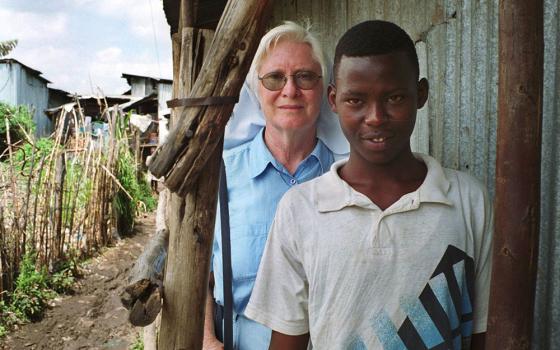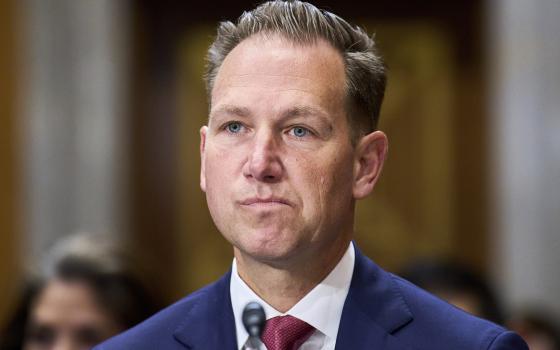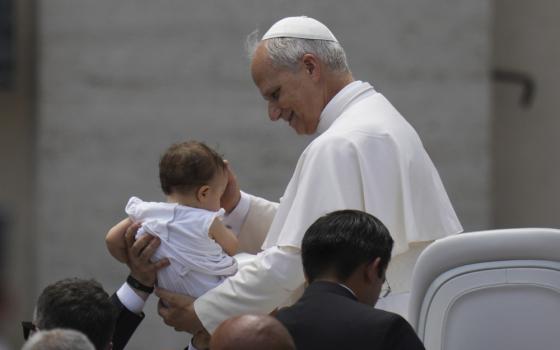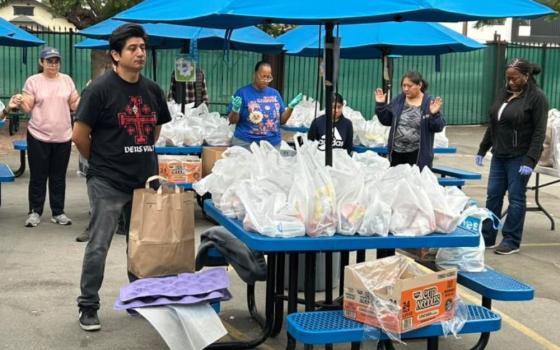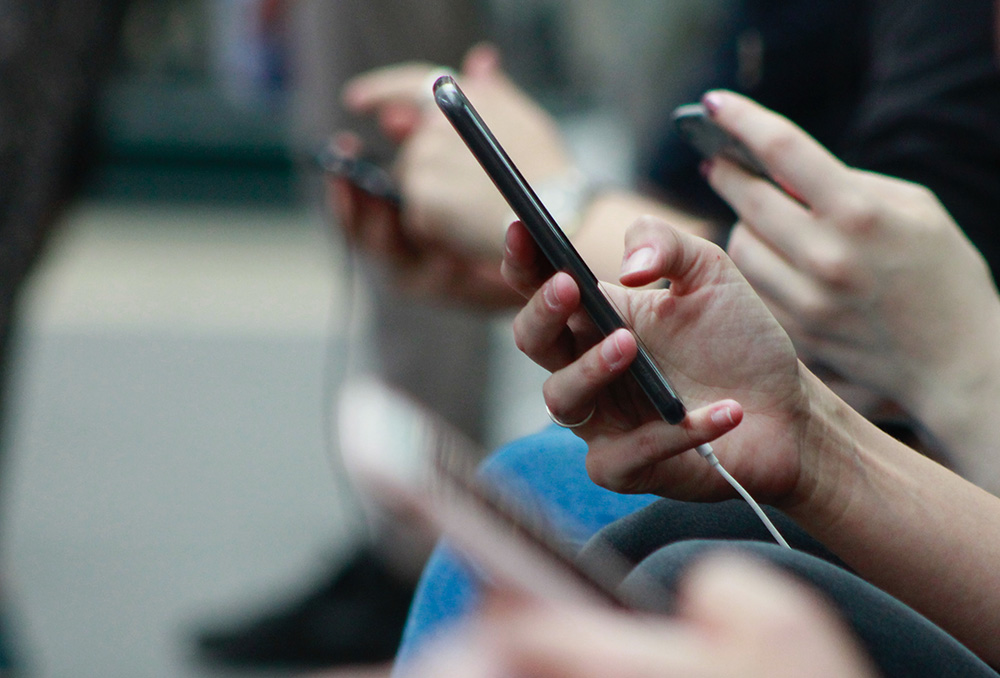
(Unsplash/Robin Worrall)

(GSR logo/Toni-Ann Ortiz)
The Life panelists this month tackled a topic that should be of interest to everyone. With wisdom and common sense — and great insights into community life and social media — they addressed this question:
From your experience using the internet and social media, what advice would you give sisters in formation and beyond about its positive and negative potential in living a healthy spiritual life and nurturing relationships in your own community or congregation?
______
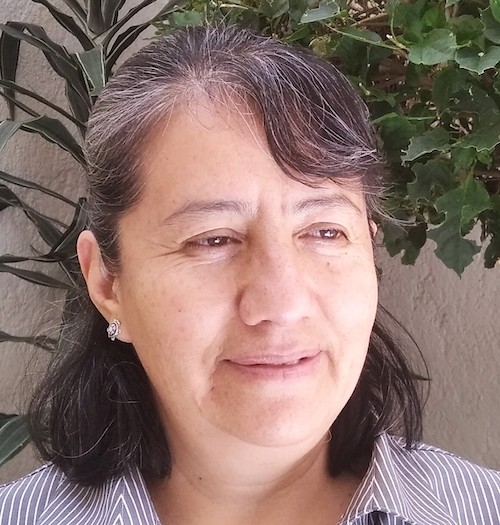 Blanca Alicia Sanchez is a sister of the Verbum Dei Missionary Fraternity in Mexico City. She received early formation and education in Guadalajara, Mexico, a licentiate in Rome, and other courses in the Philippines, Portugal, Mexico and England. A teacher of dogmatic theology and a spiritual director, she has worked in vocations, retreats and novitiate formation. She was a formator in the International Centre of Missionary formation in Spain and in novitiates in the Isle of Wight, United Kingdom, and Cebu, Philippines.
Blanca Alicia Sanchez is a sister of the Verbum Dei Missionary Fraternity in Mexico City. She received early formation and education in Guadalajara, Mexico, a licentiate in Rome, and other courses in the Philippines, Portugal, Mexico and England. A teacher of dogmatic theology and a spiritual director, she has worked in vocations, retreats and novitiate formation. She was a formator in the International Centre of Missionary formation in Spain and in novitiates in the Isle of Wight, United Kingdom, and Cebu, Philippines.
Strolling through a park in Mexico City, lost in contemplating the setting sun and beautiful surroundings, I am rudely interrupted by my cellphone. Answering, I discover it's someone at loose ends waiting for a bus, ringing because they "don't have anything else to do."
Oh, how I long to be able to go out without taking my cellphone along, to enjoy the peace and quiet of the park, to have time and space to be with myself and God. And why not? What's stopping me?
Still, pondering this, I remember my first impressions of social media: What an incredible gift to be able to communicate with missionary brothers and sisters across the globe — in Africa, Asia and Australia — as if they were all right here with me. I felt so connected and up to date with what was going on in the world. And how useful to have a virtual platform from which to share my Gospel reflections!

Sometimes we can foster friendships through social media. But nothing can replace the wellspring of love and happiness inside of each one of us and the friendships built upon the daily sharing of life. (Blanca Alicia Sanchez)
I experienced the benefits of social media but also suffered its negative side on a personal level. Constant alerts and notifications affected my concentration and focus, making profound reflection almost impossible. To facilitate an atmosphere of silence, I decided to turn off the notifications on my cellphone and computer.
Better able to concentrate and focus, I enjoyed my missionary work again. Preparing Gospel reflections allowed me to be in touch with my feelings and inner self. Connected to this wellspring inside, I feel truly myself. This is the genuine source of my communion and connection with others.
My advice to missionaries in formation: Be aware of what's driving your use of social media. Why do you want to be connected? True, humans are naturally social beings. We need to have friendships and to live in communion with others. Social media is helpful, but virtual relationships are a poor substitute for real-life friendships.
My own life and vocation have been deeply enriched by time spent with community sisters; it fosters true friendships, helps me feel loved for who I am and not for my virtual self. Time to reflect and pray about my needs, boredom, joys and pains allows me to become more aware of my inner world and the needs of my sisters of community, particularly those who are experiencing greater loneliness and isolation because of the pandemic and could do with a listening ear.
In my community, the Verbum Dei Missionary Fraternity, we dedicate ourselves to prayer and the preaching of the Gospel and are expanding our evangelizing presence on social media. It's wonderful that each day, Gospel reflections shared on social media are reaching people all over the world.
However, my self-worth and value are not dependent on the amount of likes these reflections receive. I am loved by God, my real friends and my community; I do not need to go looking for the attention and love of virtual people who do not know me as I am. The joy I experienced seeing my friends at the end of the COVID-19 lockdown, being able to look them in the eye and enjoy their company, is incomparable to that of connecting with them via a screen.
Of course, sometimes we can foster friendships through social media. But nothing can replace the wellspring of love and happiness inside of each one of us and the friendships built upon the daily sharing of life in all its glory: the good, the bad and the ugly. There is no need to hide ourselves in a virtual world.
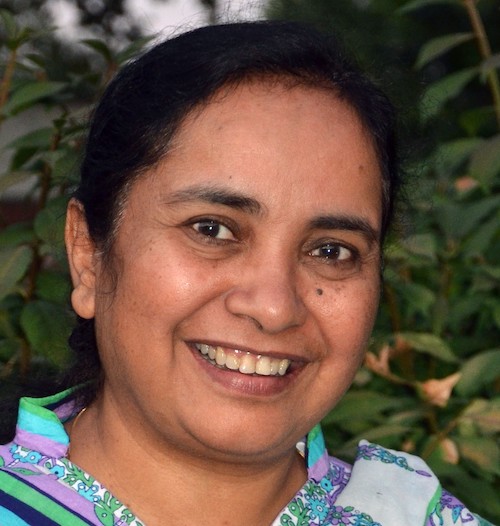 Nasreen Daniel is a member of the U.S. Sisters of Loretto. From Lahore, Pakistan, she obtained paralegal training and a master's degree in English in Pakistan. Further studies in India and the Netherlands included international law and theology, social studies, counseling and religious studies. She taught in seminaries in Pakistan and in academies in the United States and was a field worker and journalist for the Society for the Protection of the Rights of the Child, a Muslim/Christian consortium. She has published in English, Urdu and Dutch. Since 2016, she has been the chairperson for Major Superiors Leadership Conference of Pakistan.
Nasreen Daniel is a member of the U.S. Sisters of Loretto. From Lahore, Pakistan, she obtained paralegal training and a master's degree in English in Pakistan. Further studies in India and the Netherlands included international law and theology, social studies, counseling and religious studies. She taught in seminaries in Pakistan and in academies in the United States and was a field worker and journalist for the Society for the Protection of the Rights of the Child, a Muslim/Christian consortium. She has published in English, Urdu and Dutch. Since 2016, she has been the chairperson for Major Superiors Leadership Conference of Pakistan.
I was born in an oral culture. About 50 Christian families lived on the bank of the river Jhelum, and the roofs of our houses were joined. In summer, we all used to sleep on the roofs, and the children would call each other if a story was going to be told. So all our grandmothers told the stories to all the kids who came to listen. We used to anticipate those summer nights and listening to the stories.
Later, in school, I got into reading stories and then writing, as well. And now, social and cultural knowledge is shared in minutes or seconds via the media. In a matter of seconds, the news from one part of the globe reaches the remotest areas of the world. Whereas in the past, it might have been considered profane, now, it is entering the spheres of sacred. In this era, nothing remains local; it is all global.
Today, the fastest and most effective medium of interaction is mass media. It has made the learning process easier and faster, whether the learning be in social or religious institutions. The distances between the continents have evaporated. A good history teacher in Kentucky teaches Loretto history to young women in Pakistan about their congregational history, culture, values and ideas.
Earlier, we would wait a month for books or papal encyclicals to arrive, and now, we can download them in a blink of an eye. Practices like meditations can be found in different languages and from diverse religious backgrounds.
Reading the life of saints, which took months with a real book, can be learned in a few hours via a film, and the experience is often remembered more vividly than from reading or listening to the books. And the media can provide materials suiting specific tastes and needs.
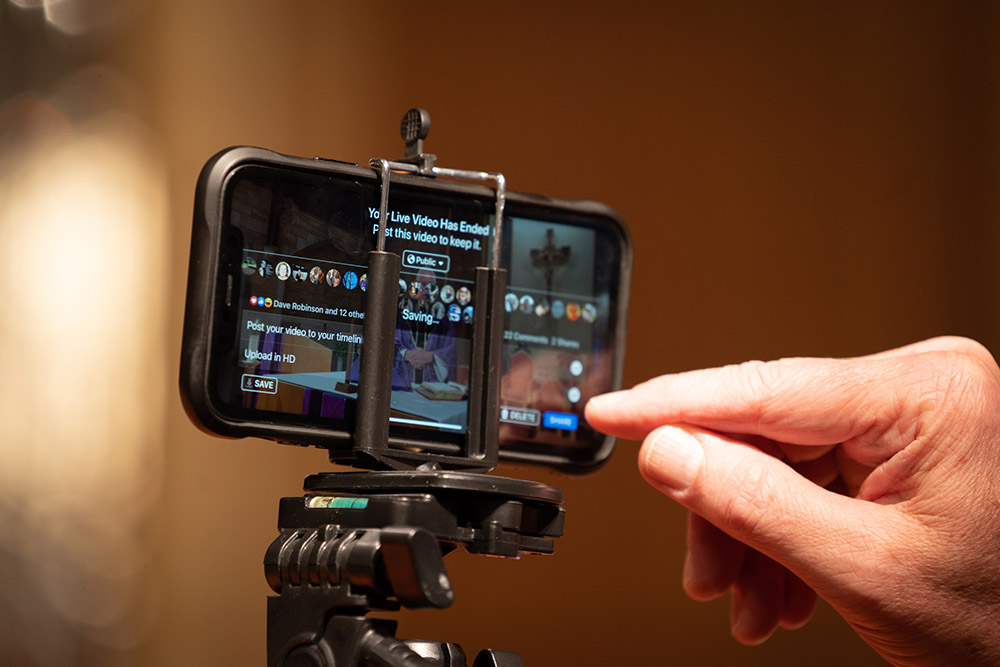
Fr. Tom Kovatch ends a livestreamed Mass that he broadcast on Facebook Live from St. Charles Borromeo Catholic Church in Bloomington, Indiana, March 24, 2020, during the coronavirus pandemic. (CNS/Katie Rutter)
Especially in this time of the coronavirus, technology and social media have played a beneficial role for the faithful: They can participate in prayer services and Masses without leaving the safety of their home. The clergy had to educate themselves about the structure, conditions and limitations of the media and how to make their services far-reaching beyond the domain of their parishes, even extending to an audience in other countries and in different geographical settings.
As media decreased the geographical distances, it has sometimes increased personal distances. A community of three or four religious might know more about the outer world than about the inner one. Recreation time, which was the heart of community living, can now be merely three or four individuals sitting in the same room. They are connected via their phones somewhere but not really present in the community. The community socialization is diminishing while individualism is on the increase, and devices are taking the places of community members.
No one can deny the importance of media in today's world and its obvious and subtle effects. It is a new reality that we are facing. What will be our response? How can we accommodate the demands of this age so the formation for religious life may not lag behind in the 21st century? At the same time, how do we assure that access to media resources help deepen and widen the experiences of religious life?
The big question of this era is how to seek appropriate resources for good religious formation and community living and how to prevent social media addiction among the community members.
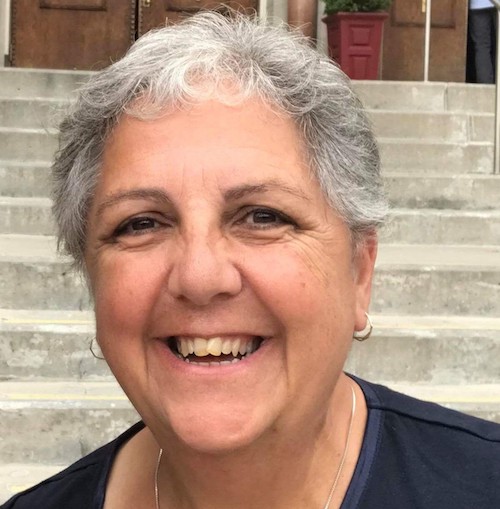 Rita Malavisi is a Sister of St. Joseph of the Sacred Heart from Melbourne, Australia, of Italian and Arabic ancestry. In Melbourne, she studied primary teaching, religious education and spiritual direction and worked in both elementary and high school education as well as parish ministry. While serving as information technology coordinator for her community, she did adult faith formation as well as pastoral care for asylum-seekers. She recently graduated with a degree in pastoral studies from the Catholic Theological Union in Chicago and currently serves as the national chair of the Conference of Spiritual Directors Australia.
Rita Malavisi is a Sister of St. Joseph of the Sacred Heart from Melbourne, Australia, of Italian and Arabic ancestry. In Melbourne, she studied primary teaching, religious education and spiritual direction and worked in both elementary and high school education as well as parish ministry. While serving as information technology coordinator for her community, she did adult faith formation as well as pastoral care for asylum-seekers. She recently graduated with a degree in pastoral studies from the Catholic Theological Union in Chicago and currently serves as the national chair of the Conference of Spiritual Directors Australia.
"Face-to-face, simulcast, livestreamed, broadcast": This is how the priest began Mass at the beginning of July this year. I was listening via an app on my phone!
The online space is a creative opportunity to reach people and connect in a way that we haven't done before. People need connectivity with other people to thrive and survive; when physical contact is inhibited, our virtual space can even nourish our faith.
In a 2001 article, writer Marc Prensky coined the terms "digital immigrant" and "digital native." He suggests that those born after 1982 are immersed in technology and assumed to be naturally proficient with digital technologies; people like me are digital immigrants, who had to migrate to the digital world.
Advertisement
The majority of us in religious life are digital immigrants, some fearful of the bullying messages on Facebook, Instagram, TikTok. I am afraid there is a divide in congregations, with some members not even aware of how engaging social media is for the younger members.
Here are some comments that I've heard from other sisters in my community:
- "I don't have time."
- "I'm a Luddite."
- "Oh, you're young, you've grown up with computers." (I had to remind her that at 60 years of age, I'm not young!)
Our sisters in formation are mostly comfortable using technology, so we can't remove it from formation programs. However, we need to learn to disconnect from the world occasionally; I take a device-free triduum or turn off the world in my annual eight-day retreat.
Even during my novitiate some 30 years ago, before the internet and mobile phones, my novice director asked that we have no contact with family for three months to become used to detachment and being in liminal space. That wasn't easy for me, given my culture, nor for my family, who relied on weekly contact.
Though we need to be vigilant and teach one another how to use the internet and social media responsibly, there are just too many positive things about technology and social media that completely outweigh any negatives. Virtual connection has allowed us to be radically relational, rooted in this connection with people all over the world. And no matter how many algorithms are dreamed up by big corporations to push notifications, we have the power to make the conscious choice to ignore them.
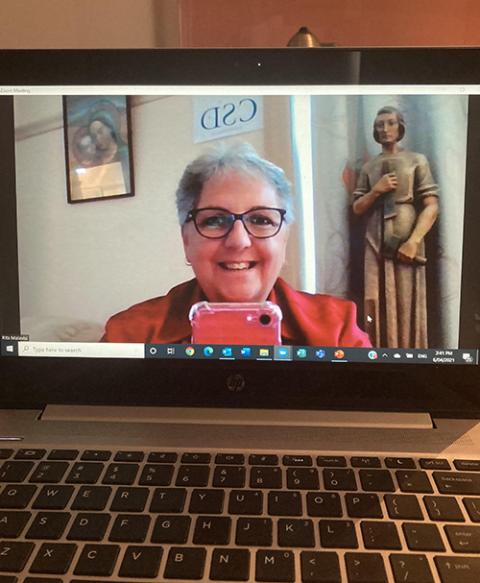
Sr. Rita Malavisi at the launch of the website for the Conference of Spiritual Directors Australia (Courtesy of Rita Malavisi)
At this time, Melbourne is in another strict lockdown because of COVID-19 infections. Without the internet and social media, our connections would be lost. During the past 18 months, the sisters of my region have all begun using Microsoft Teams for monthly connecting in community groupings. Our average age is 81, so it is not a simple feat to connect us all remotely in lockdown.
Though a few have not enjoyed the virtual connection, most have found it to be life-giving and spiritually uplifting, providing times of deep sharing and prayer. It's not ideal; it will never replace face-to-face. The Religious Formation Conference in Chicago has offered courses online for those in formation preparing for life vows. Even though our Australian sisters in formation have to get up in the middle of the night, they have found these experiences most rewarding, and the networking invaluable.
We have sisters in a number of countries around the world; before COVID-19, we would never have thought about a regular prayer time together. Now, it nourishes and sustains us. And it is here to stay — globally and for all.
In July 2020, I virtually attended the life vow ceremony of Sr. Tracy Kemme, a Sister of Charity of Cincinnati, with more than 500 people streaming from all over the world. I felt as much a part of the ceremony as if I were there in person.
If the world is using social media constantly, the Catholic Church and our congregations need to be at the forefront of positive messages of evangelization, goodness and humanity, as well as spreading the seeds of Catholic social teaching across whatever platform we have.
As Pope Francis wrote in Evangelii Gaudium, "Find ways to communicate Jesus wherever we are."
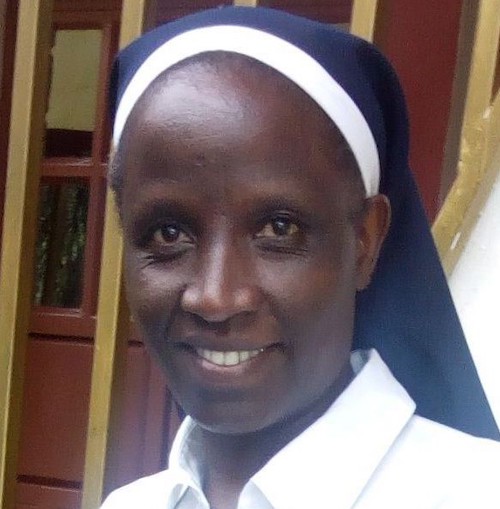 Agnes Musemba Mativo is a Kenyan member of the Religious Sisters of Mercy. Her ministries have included social work with HIV/AIDS patients in Zambia and in mission advancement at a Mercy hospital. She pursued studies in clinical psychology at the Pontifical Gregorian University in Rome and teaches psychology in two Catholic institutions. Currently, she works with men and women in formation as well as priests and religious, teaching and in psychological accompaniment. She has served as postulant mistress and continues as vocation promotor for her own congregation.
Agnes Musemba Mativo is a Kenyan member of the Religious Sisters of Mercy. Her ministries have included social work with HIV/AIDS patients in Zambia and in mission advancement at a Mercy hospital. She pursued studies in clinical psychology at the Pontifical Gregorian University in Rome and teaches psychology in two Catholic institutions. Currently, she works with men and women in formation as well as priests and religious, teaching and in psychological accompaniment. She has served as postulant mistress and continues as vocation promotor for her own congregation.
Social media has become an important part of modern living. It contributes to making the world a global village. Through it, we have been able to connect to the rest of the world without having to leave the comfort of our houses, as witnessed recently at the height of the COVID-19 pandemic. That experience should help us discover who we are, become closer to one another, and deepen our personal relationship with God.
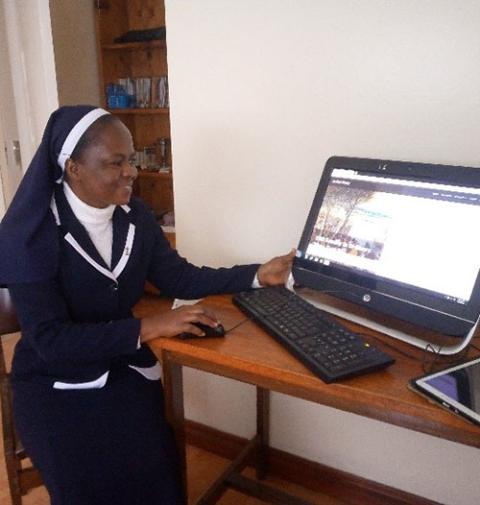
Sister Celestine makes use of the internet in her ministry with young people. (Courtesy of Agnes Musemba Mativo)
However, like most good things, social media has had its own downside.
One of the things we need to accept is that many of the young people knocking on the doors of our convents and seminaries have never known the world in its analog phase and, regrettably, some of them have become addicted to social media. How can we help them to navigate through the waters of social media and emerge unscathed, as well as being deeply reflective and responsible people?
From the perspective of religious life, do the disadvantages of social media outweigh its advantages? How do we strike a balance in the use of the internet and social media, both for us in ongoing formation as well as those in initial stages of formation?
The downside of social media is falling prey to addiction. I feel this is one of the greatest challenges that communities and congregations are facing today. We were created to be free people, and addiction works against this inner freedom.
When we give in to the unnecessary use of social media, it can suck our life energy into specific obsessions and compulsions — spending endless hours on WhatsApp, Facebook, Twitter — leaving little energy for community members and apostolate.
Looking at it from a spiritual perspective, addiction is a deep-seated form of idolatry because what we are addicted to unconsciously become our false gods to whom we give most of our time and energy. "For where your treasure is, there also will your heart be" (Matthew 6:21).
We should learn to exercise personal responsibility in the use of social media. Perhaps we need to reflect individually and collectively on the following questions:
- How much time do I spend on social media?
- Does it take me away from my connection to others?
- Could the time spent on the internet and social media be filling up some emptiness in my life?
These questions might help us examine whether we are making proper use of social media or not.
 Rosemary Achien'g Oduol a Kenyan member of the Franciscan Missionary Sisters for Africa, has a nurse/midwife background with a graduate degree in public health. She has diverse experience in ministry, including nursing education and community nursing with HIV/AIDS patients in Kenya, Uganda and Zimbabwe. She has also worked as a CEO of a mission hospital in South Sudan and as a member of her area leadership team. Currently, she is ministering at the congregational headquarters in Ireland as assistant superior general.
Rosemary Achien'g Oduol a Kenyan member of the Franciscan Missionary Sisters for Africa, has a nurse/midwife background with a graduate degree in public health. She has diverse experience in ministry, including nursing education and community nursing with HIV/AIDS patients in Kenya, Uganda and Zimbabwe. She has also worked as a CEO of a mission hospital in South Sudan and as a member of her area leadership team. Currently, she is ministering at the congregational headquarters in Ireland as assistant superior general.
At the rate internet technology is exploding around the world, I wonder what the next discovery will be?
I have found the internet extremely intriguing and a very useful technology — I have used the internet to communicate, study, access required information for work, and socialize. I am aware that as consecrated women, we remain apprehensive around the internet and social media; I want to promote massive adoption of social media among religious to support social change.
Religious and those in religious formation need to understand the internet, how it works and how to use it. We can no longer run away from the internet because its goodness outweighs the dangers it poses.
The recent COVID-19 pandemic has just spotlighted the positives of social media and internet technology. How could we have survived without internet during this period? It allowed people to work from home, reducing infection opportunities; people kept in touch through social media; scientists used the internet and computer technology for research.
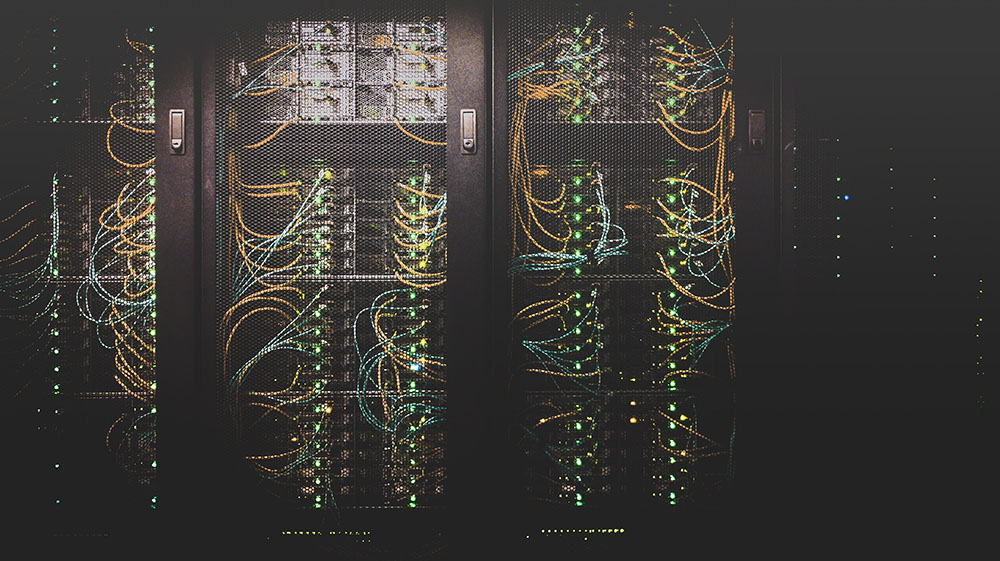
(Unsplash/Taylor Vick)
Since the internet has become a valuable source of information, we need to contribute to the building of suitable online content that can be used by everyone. The internet is used to influence cultural change and promote business, fashion, behavior — but not everything on social media is true.
To reduce abuse and encourage authentic content, we need to act. If we shun the internet, we allow space for abusive content and lose opportunities to share our values and contribute to social transformation. Those values we hold dear should be visible on social media so that those who visit our social media can access them.
Whenever we engage with social media, we leave behind a digital footprint that lives forever. I watched with disbelief when, recently, the BBC reported that the England and Wales Cricket Board suspended a bowler for tweets from 2012 and 2013, when he was a teenager. We need to learn how to be on social media with integrity and remain relevant.
Social media offers great opportunities to link up with peers and friends; however, we must engage with social media with discipline and prudence and know how to use it.
I recently discovered that on average, I receive 3,000 messages by the time I wake up in the morning. It is impossible for me to read them all. The messages are noisy and disruptive, even if I mute the phone. They still cause emotional and psychological noise; they are time-consuming and can easily interfere with community space and time.
Social media groups: We all want to belong, to share and link up. But it is critical that we know the purpose and regulations of our particular social media groups and know the people in them. Otherwise, we might find ourselves in dangerous company. We need also to protect our data while on social media and avoid clicking on unknown sites; some sites do phishing for personal data and can steal your passwords and data.
Most people joining religious life today have engaged with social media and the internet, so formation should seek to enhance a disciplined and informed use of it, not suppress its use. We all need to retrain ourselves to respect community time when members are present to each other and leave social media out of those times.

